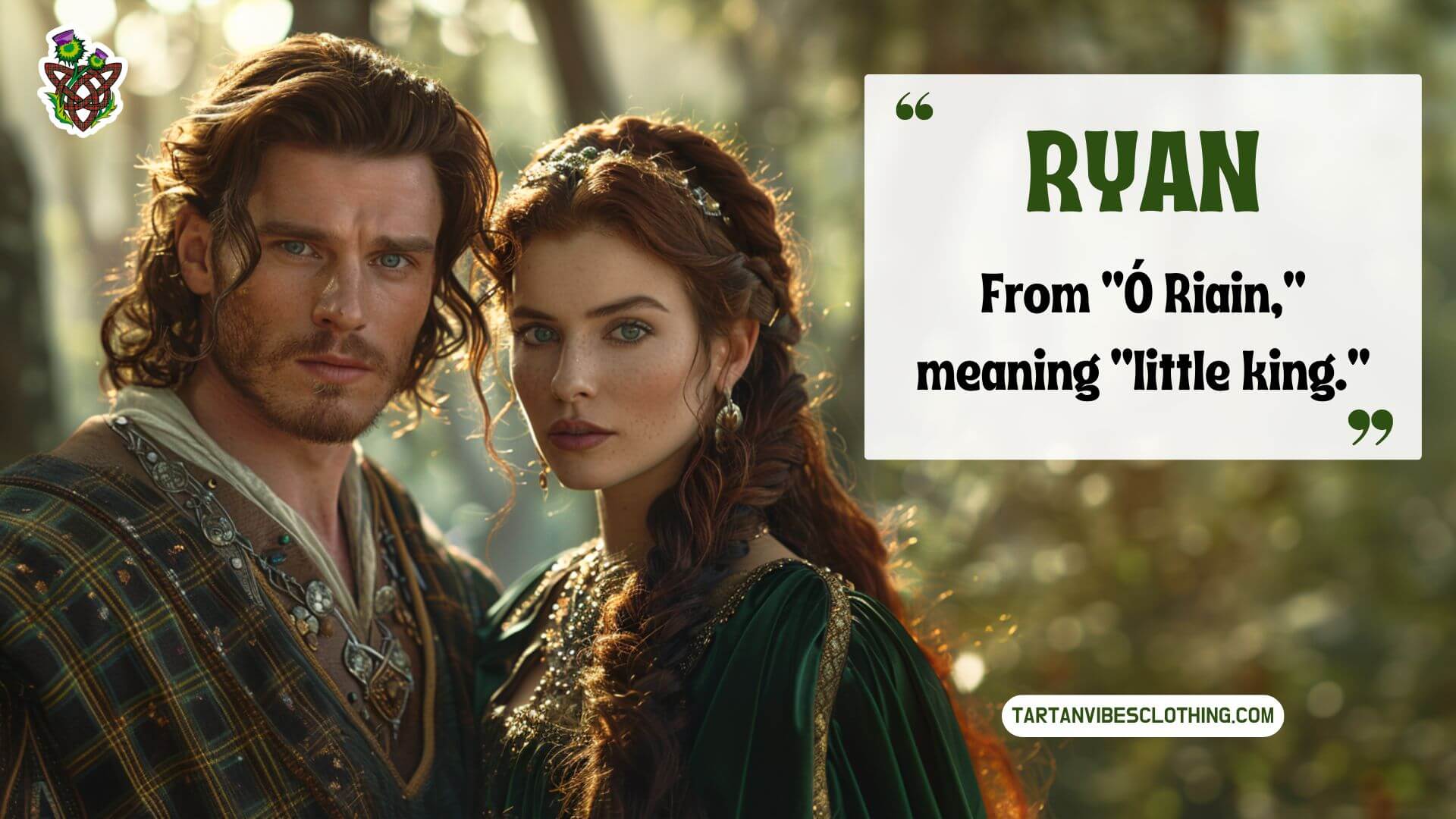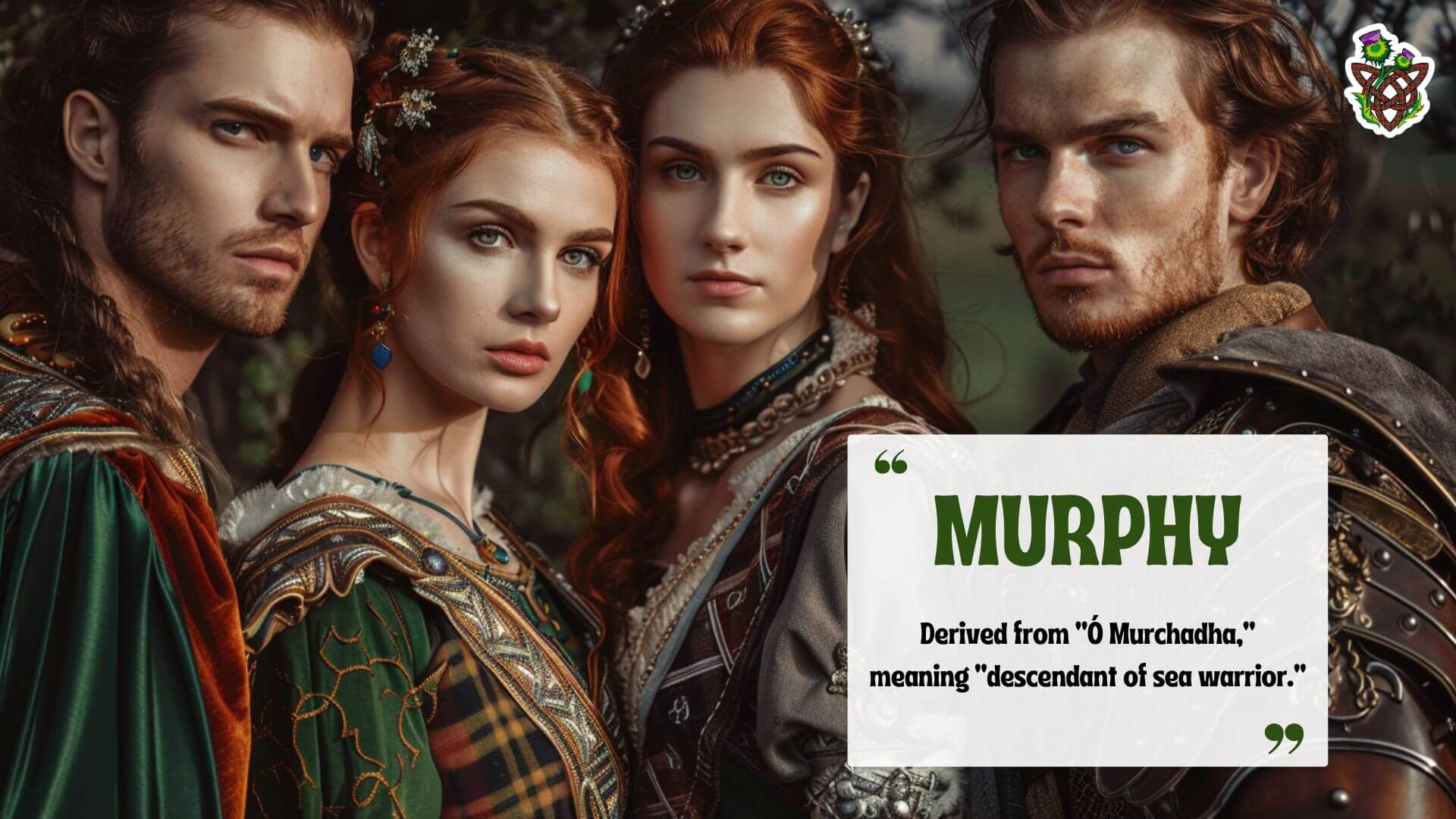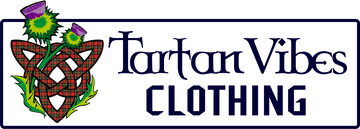Table of Content
The Celtic heritage is rich with history, culture, and traditions that have stood the test of time. One of the most intriguing aspects of this heritage lies in the surnames that have been passed down through generations. These surnames carry stories of ancient clans, occupations, geographical features, and even legendary heroes. This article delves into the fascinating origins of the top 120 Celtic surnames.
I. Understanding Celtic Surnames
A. What Are Celtic Surnames?

B. The Origins of Celtic Surnames
The origins of Celtic surnames trace back to ancient eras when tribes and clans inhabited what is now known as Ireland, Scotland, Wales, Brittany, and Cornwall. These names served as labels and carried important significance related to ancestry, profession, or individual traits. In early Celtic culture, a person's last name typically reflected their clan or family affiliation. For example, surnames starting with "Mac" or "Mc" mean "son of," whereas "O'" denotes "descendant of". These prefixes were essential for denoting lineage and were frequently connected to the names of fathers or prominent ancestors.

As time passed and societies changed and blended, these surnames evolved. The effects of invasions, migrations, and shifts in political power played a role in the adaptation and alteration of Celtic surnames. Nevertheless, many ancient Celtic last names continue to preserve their original meanings, serving as a lasting source of cultural pride and identity.
C. How did the Celtic people name and surname?
One typical method is patronymics, where a child's last name comes from their father's first name. For instance, MacDonald translates to "son of Donald." Similarly, though rarer, matronymics are derived from the mother's name. Another significant tradition involves occupational surnames. These names often reflect an ancestor's job or position in society.

For example, Smith denotes a blacksmith, while Baxter signifies a baker. Descriptive surnames are also common in Celtic cultures. These names illustrate physical features, character traits, or noteworthy achievements. Brown may refer to someone with brown hair, while Strong could indicate someone recognized for their physical prowess.
II. Categories of Celtic Surnames
A. Irish Celtic Surnames
Irish Celtic surnames are deeply rooted in the country's history, often derived from Gaelic origin. The structure of these names frequently includes prefixes such as "O'" or "Mac," indicating lineage and ancestral connections. Irish surnames typically reflect the geographic regions, occupations, or notable characteristics associated with familial ancestors. Carrying a sense of identity and pride, Irish surnames are prevalent within Ireland and among the Irish diaspora across the globe, showcasing the enduring legacy of Irish culture.
Here are some popular Irish Celtic surnames used in Ireland:

1. O'Brien - Descendant of Brian Boru, the high king of Ireland.
2. MacCarthy - Son of Cárthach, meaning "loving."
3. O'Sullivan - Descendant of Súileabhán, meaning "one-eyed."
4. Murphy - Derived from "Ó Murchadha," meaning "descendant of sea warrior."
5. Kelly - Originating from "Ó Ceallaigh," meaning "descendant of Ceallach."
6. Ryan - From "Ó Riain," meaning "little king."
7. Walsh - Meaning "foreigner," often referring to Welsh immigrants.
8. Doyle - Derived from "Ó Dubhghaill," meaning "dark stranger."
9. Fitzgerald - Meaning "son of Gerald," introduced by Norman invaders.
10. O'Connor - Descendant of Conchobhar, meaning "lover of hounds."
11. Flynn - Anglicized from "Ó Floinn", meaning "Son of the red-headed one"
12. Donovan - Originating from "Donnubán mac Cathail", meaning "Descendant of the dark brown-haired chieftain".

13. Regan - Anglicised form "Ó Riagáin", meaning "The kings child"
14. O'Neill - Originating from "Ó Néill", meaning "Descendant of Niall"
15. O'Carroll - Originating from "Ó Cearbhaill", meaning "Disputed."
16. McMahon - Originating from "Mac Mathghamhna", meaning "Son of the bear"
17. Coughlan - Originating from "Mac Cochláin" or "Ó Cochláin", meaning "Son of the one with the cloak"
18. Mcgee - Originating from "Mac Aodha", meaning "Son of Aodh"
19. O'Houlihan - Originating from "Ó hUallacháin", meaning "Proud."
20. McManus - Originating from "Mac Mághnais", meaning "Son of Magnus"
21. Scully - Originating from "Ó Scolaidhe", meaning "Descendant of Scolaidhe"
22. Kearney - Originating from "Ó Catharnaigh", meaning "Descendant of Catharnach"
23. McGovern - Originating from "Mág Samhradháin", meaning "The Son of Samhradhán"
24. Colgan - Anglicised form "Ó Colgáin", meaning "Descendant of Colga".
25. McKeogh - Originating from "Mac Eochaidh", meaning "Son of Eochaidh"
B. Scottish Celtic Surnames
Scottish Celtic surnames capture the essence of Scotland's rich clan culture and landscape. These surnames often denote clan affiliation, with "Mac" meaning "son of," which illustrates the importance of family lineage and heritage in Scottish society. Many of these names reflect the geographical features of Scotland, signifying association with specific regions or tribes. With a historic presence in both Scotland and its communities worldwide, Scottish surnames signify a lasting cultural identity that resonates with those of Scottish descent.
Here are some popular Scottish Celtic Surnames used in Scotland:

26. MacDonald - Son of Domhnall, meaning "world ruler."
27. Campbell - Derived from "Caimbeul," meaning "crooked mouth."
28. MacLeod - Son of Leòd, meaning "ugly" or "gray-haired."
29. Fraser - Of Norman origin, associated with the French word "fraisier" (strawberry plant).
30. MacKenzie - Son of Coinneach, meaning "handsome."
31. Cameron Derived from "Camshron," meaning "crooked nose."
32. Stewart - From "steward," denoting a household manager or administrator.
33. Smith - Denotes a metalworker, a common occupation in historic Scotland.
34. MacFarlane - Son of Parlan, meaning "little pilgrim."
35. MacIntyre - Son of an artisan, derived from "Mac an t-Saoir."
36. Robertson - Originating from "Hrodebert", meaning "bright fame".
37. Murray - Derived from a Celtic word meaning "sea settlement".
38. Clark - Derived from the Old English word for "clerk".
39. MacGregor - Meaning "son of Gregory", from the Greek "Gregorios", meaning "watchful" or "vigilant".

40. Miller - Derived from Gaelic words meaning "merchant" or "soldier".
41. Hamilton - Derived from Old English, meaning "crooked hill", used for someone from Hamilton.
42. Martin - Derived from the Latin "Martinus", meaning "of Mars", the Roman god of war.
43. Ferguson - Means "son of Fergus", a Gaelic name meaning "man of vigor".
44. Marshall - Derived from Old English and Old German, meaning "horse servant".
45. Bell - Originate from the French "bel", meaning "beautiful", or from an inn sign featuring a bell.
46. Wallace - Famous for the legendary William Wallace, a symbol of Scottish independence.
47. Duncan - Originate from the Gaelic name "Donnchadh", meaning "brown warrior".
48. MacKay - From the Gaelic "Mac Aodha", meaning "son of Aodh", with Aodh, meaning "fire".
49. Russell - Derived from Old French, meaning "red-haired" or "ruddy".
50. Douglas - From the Gaelic "dubh glas", meaning "black stream", a reference to Clan Douglas.
51. Graham: Originating from Grantham in England, meaning "gravelly homestead".
C. Welsh Celtic Surnames
Welsh Celtic surnames highlight Wales's distinct cultural identity. Typically derived from the patronymic tradition, many Welsh surnames indicate familial relationships, often signifying "son of" a given name—a practice reflecting the significance of ancestry. Combining personal names with geographic descriptors has created a rich tapestry of Welsh heritage. Due to migration and the global Welsh community, these surnames have spread beyond Wales while retaining their roots and cultural importance.
Here are some popular Welsh Celtic Surnames used in Wales:

52. Jones - Derived from "John," meaning "gracious."
53. Evans - Son of Evan, a form of John.
54. Morgan - Meaning "sea-born."
55. Price - Derived from "ap Rhys," meaning "son of Rhys."
56. Lloyd - Meaning "gray" or "holy".
57. Griffiths - Derived from "Gruffudd," meaning "strong lord".
58. Owens - Son of Owen, meaning "noble-born".
59. Jenkins - Son of Jenkin, a diminutive of John.
60. Thomas - Derived from the Hebrew name "twin".
61. Davies - Son of David, meaning "beloved".
62. Awbrey - Meaning "son of Aubrey".
63. Baughan - Derived from the Welsh words "bychan", meaning "little or small"
64. Beavin - Derived from "ab-lefan" or "ap-lefan", meaning "son of lefan"

65. Craddock - Originate from "Caratacos", meaning "love"
66. Gwalchmai - Derived from two Welsh elements, "gwalch" meaning "hawk" and "mai" meaning "field".
67. Hier - Derived from "hir" meaning "long" or "tall".
68. Hopkins - Derived from the Old Germanic name "Hrodebert", meaning "bright fame".
69. Howell - Anglicized from the Old Welsh name "Hywel", meaning "eminent".
70. Idle - Derived from the Old Welsh name "ludhail", meaning "bountiful Lord".
71. James - Originated from the Hebrew name "Jacob", meaning "supplanter".
72. Lewis - Derived from the Welsh name "Llywelyn", meaning "leader".
73. Merrick - Originates from the Welsh name "Meurig", meaning "dark-skinned"
74. Pride - Derivative of the Welsh word "prid", meaning "precious" or "dear".
75. Sayce - Originates from the Old Welsh word "sais", meaning "saxon".
D. Breton Celtic Surnames
Breton Celtic surnames represent the unique cultural landscape of Brittany in northwestern France. Many of these surnames are linked to the Breton language, showcasing the region's Celtic heritage. Generally reflecting geographic features or family lineage, Breton surnames serve as a marker of identity for the people of Brittany. Despite being less recognized than their Irish or Scottish counterparts, Breton surnames maintain cultural significance within the regional community and among those with Breton ancestry worldwide.
Here are some common Celtic last names of Breton:

76. Le Roux - Meaning "the red-haired."
77. Guerin - Derived from "warrior."
78. Le Goff - Meaning "smith."
79. Bihan - Meaning "small."
80. Kervin - Meaning "little deer."
81. Leclerc - Meaning "clerk" or "scribe."
82. Morvan - Meaning "sea hill."
83. Coat - Derived from "Coatgoureden," meaning "wooden shelter."
84. Fily - Meaning "son of the envoy," indicating an ancestor's role or occupation.
85. Abgrall - Meaning "from the old town."
86. Perroz - Derived from the Breton word for "stony," indicating a geographic feature.

87. Tanguy - Meaning "fire" and "worthy," often associated with historical figures.
88. L'Her - Likely related to the land or elements of nature.
89. Hervé - Linked to a legendary Breton saint, meaning "battle" or "warrior."
90. Guihard - Meaning "the brave," denoting a characteristic of the family.
91. Garlan - Meaning "the one from Garlan," often denoting regional lineage.
92. Bodig - Derived from the Breton word for "little" or "small," commonly used as an affectionate name.
93. Le Garrec - Meaning "the defender," indicating bravery and historical significance.
94. Lénan - Derived from "léna," meaning "the light," symbolizing brightness or enlightenment.
95. Gouaznan - Meaning "one who speaks well," indicating oratory skills or connection to a leader.
96. Traon - Meaning "the thorn," often used to signify resilience and protection.
E. Cornish Celtic Surnames
Cornish Celtic surnames reflect the distinct identity of Cornwall in the United Kingdom. Originating from the Cornish language, these surnames often signify connections to the local landscape, occupations, or community ties. Although Cornwall has a smaller population than other Celtic regions, its surnames hold a strong sense of heritage and history. As interest in Cornish identity and culture has grown, so too has the recognition and appreciation of Cornish surnames, highlighting their role in preserving regional uniqueness.
Here are some popular Cornish Celtic Surnames used in Cornwall:

97. Owen - Meaning "noble" or "young warrior," highlighting traits of valor and distinction.
98. St. Clair - Meaning "bright" or "clear,"
99. Rees - Derived from a diminutive of "Rhys", meaning "enthusiasm" or "ardor,"
100. Penrose - Meaning "top of the heath."
101. Vinter - Meaning "keeper of the vineyard,"
102. Curnow - Meaning "Cornishman."
103. Kevern - Meaning "saint's church."
104. Petherick - Meaning "the son of Peter,"
105. Griffiths - Meaning "the son of Gruffudd,"
106. Zennor - Derived from the village of Zennor.
107. Basset - Derived from the Old French word for "little," indicating a possible lineage of nobility or petite stature.
108. Hawken - Meaning "son of the hawk," symbolizing strength and a connection to nature.
109. Bennett - From "Benedict," meaning "blessed," commonly used in Cornish communities.

110. Nancarrow - Meaning the "valley of the deer".
111. Roskruge - derived from 'of Roscruge,'
112. Trevorrow - Meaning "dweller by the farmstead," indicating agricultural ties.
113. Lanyon - originates from the hamlet of Lanyon (Madron).
114. Reed - This means "red-haired" or "having a reddish hue," which often refers to physical characteristics.
115. Seward - Meaning "guardian" or "protector," often linked to protective roles within families.
116. Quick - Derived from the Cornish word "guîk", meaning a village.
117. Baragwanath - Originated from a Cornish man circa 1590.
118. Hitchens - A diminutive of "Hitch," indicating a family connection to a person named Hitch.
119. Carveth - first found in Cornwall at Carverth or Carveth
120. Mawgan - Meaning "the little hawk," indicating a keen observation and connection to nature.
Delve Into History: Uncover the Stories Behind Celtic Surnames!
In conclusion, exploring Celtic last name meanings reveals a rich tapestry of history, culture, and identity that resonates throughout regions such as Cornwall, Wales, Scotland, and Ireland. These names often carry significant meanings tied to geography, occupation, or lineage, reflecting the unique heritage of the Celtic people. By understanding the origins and implications behind Celtic surnames, we gain deeper insights into the stories and traditions of the communities from which they originate. Embracing this knowledge not only enriches our understanding of Celtic cultures but also fosters a greater appreciation for the diverse tapestry of names that connect us across generations.
Frequently Asked Questions
What makes a surname Celtic?
Celtic surnames typically originate from Gaelic, Brythonic, or Pictish traditions and reflect lineage, traits, or locations.
Why do some Celtic surnames start with "Mac" or "O'"?
These prefixes denote lineage, with "Mac" meaning "son of" and "O'" meaning "descendant of."
What are some common Celtic surnames?
Names like MacDonald, O'Brien, and Walsh are well-known examples.
What's the difference between Celtic and Gaelic surnames?
Celtic surnames encompass names from a broader range of Celtic cultures, including Irish, Scottish, Welsh, and Breton. In contrast, Gaelic surnames specifically refer to names derived from the Gaelic languages.











